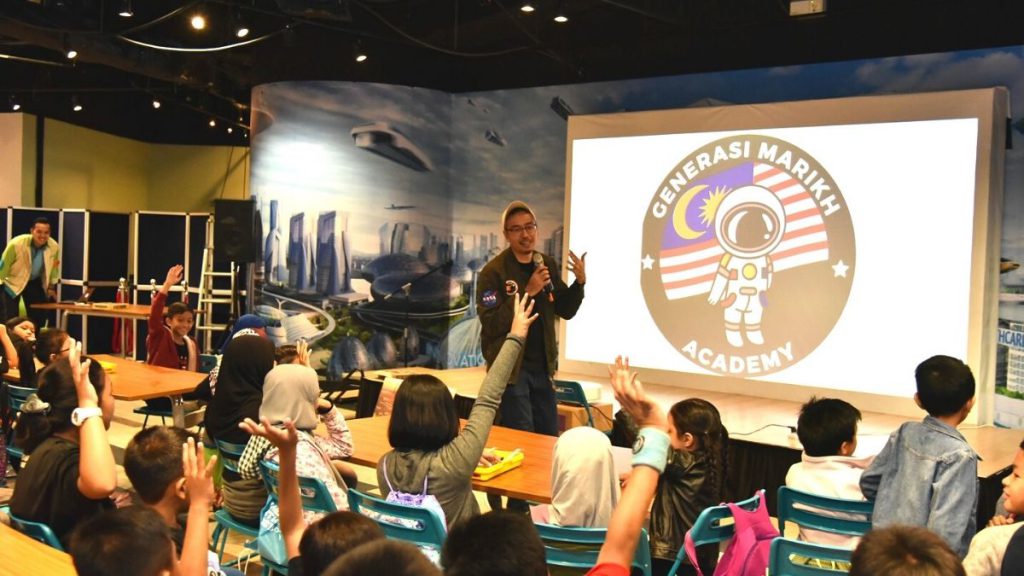Author’s Blurb: When I stepped foot into my first day in science stream back in Form 4, I just couldn’t pick up or find subjects like physics and chemistry interesting. That made me drop it altogether and go into the arts instead.
Syukran realised that only 19% of students were choosing to enter the science stream and knew that there was an issue in Malaysia’s science, technology, engineering and mathematics (STEM) education.
Hence, he started a space programme to inspire kids to go into high-value industries like engineering, robotics, and data science.
After serving in Petronas for 10 years, he became a consultant to the Malaysian aerospace industry.
There, his role was to support and promote the growth of Malaysia’s aerospace sector.
“If we want to change the trend—the erosion of interest in STEM —we need to change our traditional approach to STEM education,” he said.
Paired with his experience and a rise in edutainment theme parks like KidZania, he decided to dedicate the next stage of his life to developing space-themed enrichment camps, as no one else in the Malaysian market was doing so.
The Martian Launched The Idea
The idea of starting Generasi Marikh Academy came to Syukran from watching The Martian back in 2015.
“I was inspired by the ingenuity and tenacity of the character astronaut Mark Watney, left for dead alone on Mars and survived by solving one problem after another using science and engineering, he said.
“This is the kind of positive storytelling that we need to change the narrative of our next generation. To be leaders and innovators, not only users of technologies but creators.”

Generasi Marikh Academy conducts its programmes as leadership camps, with emphasis on STEM and space content curated by experienced trainers from the industry.
As for why he’s doing all of this, Syukran foresees that there will be a demand for space industry professionals beyond being an astronaut.
“Most of the space jobs are on the ground, robotics satellite and rocket engineers, data scientists, software engineers, planetary and earth observation scientists for example,” he explained.
“These talents can serve in other industries as well, especially since the country wants to move towards high-value industries in the future.”
The trainers work with learning and development specialists to design modules that are educational yet fun.
These include hands-on activities, curated tours, role play and gamification.
Occasionally, they collaborate with robotics, drones and coding vendors to run more in-depth technical workshops.

“One of our signature camps, The Space Race Junior replicates the astronaut selection process by NASA and the European Space Agency (ESA) where we focus on health, fitness and nutrition education,” Syukran said.
“We also emphasise teamwork and communication skills. Astronauts are excellent communicators and some are very charismatic. We want to nurture our space cadets to be future leaders,” he said.
Altogether, programmes like these are meant to build a child’s soft skills while highlighting local societal issues.
For example, Space Race Junior is meant to highlight the issue of obesity, as Malaysia has one of the highest obesity rates in Asia.
Nurturing The Next Generation
Currently, Generasi Marikh Academy has hosted 6 camps, each attracting 25 to 50 kids per batch.
CSR programmes involving orphanages and rural youths can bring between 100 to 250 kids.
Syukran also keeps close relationships with the parents in order to nurture the child’s interest with their programmes and inform them of upcoming space events and workshops, which he noted that they appreciated.
“I usually spend some time with parents before and after the camps to share my views on how to nurture their kids’ interests further. They follow me on social media and often become good friends. I try to add as much value as possible,” he shared.
“Obviously it will take a few years to see the direct impact of my camps on a kid’s education and career choices, but we try our best to nurture those who show strong interest.”

Syukran runs Generasi Marikh as a passion project. His team of facilitators includes mostly college and university students studying in STEM fields, with occasional guest speakers from relevant industries.
Due to COVID-19 however, the team had to halt their camps and move to selling merchandise on their website.
He said that it helps that the kids already love collecting the academy’s merchandise like different t-shirt designs and mission patches offered at the camps, which makes them go back for more.

Once the pandemic is over, he hopes to grow the academy by running his programmes with schools.
Exploring Malaysia’s Future In Aerospace
Syukran was also recently invited to contribute to a Malaysian government initiated workshop to chart Malaysia’s new industrial master plan to discuss the role of the aerospace sectors for the country’s economy.
Thus, we were curious to find out what he thinks is needed for the local space industry to progress in the future.

“We need to look at nations such as UAE and India to see how they grow a space industry from nothing. Closer to home we have Australia, Thailand, Vietnam who are aggressively growing their space sector, launching satellites and other space programs that directly impact the economy and communities. Singapore is positioning itself as a newspace hub, focusing on space applications, he shared.
“The UK Space Agency is playing an important role in linking academics to industry, and the Government has identified the UK space sector as a vital contributor to their economy.”
He finally added that the Malaysian Space Agency (MYSA) already has plans to table a new space bill in Parliament soon.
Bottom Line: I’m glad to hear that there are plans going on to develop Malaysia’s space scene, as it’s still a pretty new sector that we barely hear about locally.
- You can find out more about Generasi Marikh Academy here.
- You can read more about other Malaysian startups here.
Featured Image Credit: Generasi Marikh Academy













